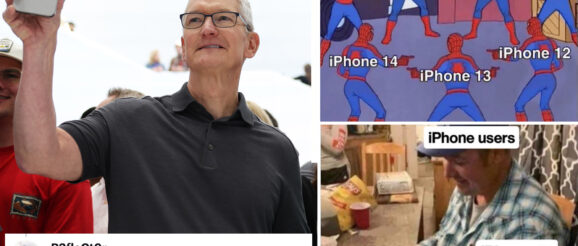Apple users bash new iPhone 15: ‘Innovation died with Steve Jobs’

Guess their favorite tech brand isn’t the apple of their eye — or, i — anymore.
Smartphone fans have been griping about Apple’s new devices since the arguably anti-climactic announcement of the forthcoming iPhone 15 on Tuesday.
On X (formerly Twitter), users have gone so far as to claim “innovation died with Steve Jobs,” the co-founder and former Apple CEO who died in 2011 from cancer at the age of 56.
The new iPhones, slated to drop on Sept. 22, feature never-before-seen color-infused glass — an “industry first” — and new charging ports.
While the display size is comparable to the 14, the 15’s titanium design makes it their “lightest weight Pro models yet,” Apple CEO Tim Cook wrote on X.
But the improved dual camera system, overall enhanced performance and expanded safety features aren’t enough to amateur online critics who claim the iPhone 15 models lack enough innovation to differentiate them from the previous generation.
“Apple’s innovation died with Steve Jobs,” one disgruntled critic wrote on X. “Most everything since 2011 has been .5-1° improvements on existing products — save for the watch — which was kind of inevitable anyways.”
“Meet the new Apple iPhone 13, I mean 14, no sorry 15!” quipped another.
“Followed the Apple event and there is no difference between the iPhone 14 and iPhone 15,” argued someone else.
“I’m a die-hard Apple fan and iPhone 15 is so bland,” griped one disparager. “I’m skipping and waiting to see iPhone 16. This should have been called iPhone 14.2. This wasn’t enough to earn the ’15.’”
The Post has reached out to Apple for comment.
Kaiann Drance, Apples VP of Worldwide iPhone Product Marketing, insists the updated smartphone models are “a huge leap forward” in innovation, according to the company’s press release.
But some Apple zealots are rejoicing over a reportedly customizable action button where the mute switch once was.
If true, the new feature, according to MacRumors, would greatly differentiate the iPhone 15 from past models, allowing users the capability to “access various functions and settings without necessarily unlocking the device or navigating to an app.”
Although, it doesn’t seem to be enough for unsatisfied customers on X.
But this isn’t the first time the tech giant has faced scrutiny for losing its “soul” after Jobs’ death, according to the book “After Steve: How Apple Became a Trillion-Dollar Company and Lost Its Soul” penned by Tripp Mickle of the New York Times.
